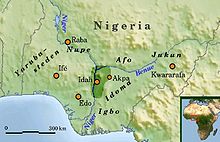Igáláà | |
|---|---|
 Territory of the Igala Kingdom | |
| Total population | |
| 1,620,000 (2020 estimate)[1] | |
| Regions with significant populations | |
| North Central Nigeria (Middle Belt), Parts of Southern Nigeria | |
| Languages | |
| Igala | |
| Religion | |
| Predominantly Minority | |
| Related ethnic groups | |
| Nupe, Yoruba, Idoma, Edo, Igbo, Anioma, Jukun, Gbagyi |
| People | Àbó Igáláà |
|---|---|
| Country | Anẹ Igáláà |
The Igala people are a Yoruboid ethnolinguistic group native to the region immediately south of the confluence of the Niger and Benue Rivers in central Nigeria. The area inhabited primarily by the Igala is referred to as Igalaland. Situated in an especially ecologically diverse region of Nigeria, the Igala have traditionally engaged in crop cultivation,[4] and have been influenced culturally by many surrounding cultures over the centuries. Today, people of Igala descent are estimated to be at a population of 1.68 million people.
The Igala kingdom is ruled ceremonially and culturally by the Attah[5] and has a long history of political warfare and campaigns with neighbouring groups along the Benue.[6] Igala people traditionally worship the supreme being Ojo, as well as their divine ancestral spirits.[7] Masquerades are an important aspect of Igala art and a prime example of the kingdom's cultural exchange with its neighbouring groups.[8] Igala art, dating centuries back, also feature in Nigerian body decoration[9] and cultural architecture.[10]
Today, the Igala predominantly inhabit southern and eastern Kogi State where they are the majority ethnicity and a major regional bloc in Kogi state politics. In times past, the Igala have held key state government positions.
While the present kingdom has diminished in size, Igala people and their culture have been an integral part of the formation of the communities along the Niger River, with many communities claiming an ethnogenesis from Idah, the ancestral home of the Igala. Minorities of the group exist in and are native to Edo, Delta, Anambra and Enugu states.
- ^ "Igala". Ethnologue. Retrieved 3 November 2023.
- ^ "Igala | people".
- ^ "UNHCR Web Archive".
- ^ Cite error: The named reference
:5was invoked but never defined (see the help page). - ^ Cite error: The named reference
:13was invoked but never defined (see the help page). - ^ Cite error: The named reference
:6was invoked but never defined (see the help page). - ^ Cite error: The named reference
:3was invoked but never defined (see the help page). - ^ Cite error: The named reference
:7was invoked but never defined (see the help page). - ^ Cite error: The named reference
:4was invoked but never defined (see the help page). - ^ Cite error: The named reference
:8was invoked but never defined (see the help page).